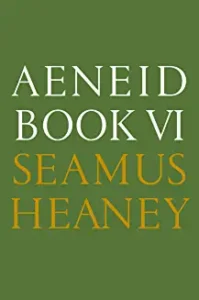The Aeneid by Virgil, translated by Seamus Heaney 2016
Heaney, the Nobel Prize winning Irish poet undertook the translation of what is perhaps the best known and most loved Book in ‘The Aeneid’ in 2007. His granddaughter had recently been born; he continued to mourn the passing of his father; and he wanted to honor the memory of his Latin teacher at St. Columb’s College, Father Michael McGlinchey.
Having just finished the Fagles translation of ‘The Aeneid’ in part motivated by my desire to honor the memory of my own Latin teacher, Miss Violet Zielke, and having just finished Heaney’s ‘One Hundred Poems’, it seemed a natural next step to read this book, described by Heaney as “neither a version nor a crib: It is more like classics homework.”
Reading this beautiful translation was enlightening. First, Heaney’s language is a wonderful combination of the old Latin and the contemporary argot. For example, at one point where Aeneas’s father, Anchises, is reunited with his son in the underworld, Heaney writes ‘It so happened he was just then taking note of his whole posterity….” while Fagles writes ‘By chance, he was counting over his own people.” Second, Heaney, a distinguished poet, takes 1222 lines to convey Virgil’s 901 lines in the original Latin while Flagles’ version of Book Six has 1040, another reflection of Heaney’s rich use of language. And when Flagles translates Cerberus’s eating of the drug-filled sop, he says the beast ‘snapped it up’ while Heaney writes the three-headed dog ‘snaffes’ it.
This opportunity to compare versions once again highlighted the difficulty and the opportunity to write poetry in translating poems. Do you do a word for word translation or try to convey the poet’s original intent in new language, even richer in poetry. Fagles, a professor at Princeton, was highly honored as a translator, Heaney, a professor at Harvard and Oxford, was highly honored as a poet, and there’s the difference in these two versions.
One striking take away from the Heaney that I failed to appreciate in the Fagles is the section where Anchises is showing his son the desecendants who will bring glory and honor to Rome, to whom will ‘fall the exercise of power/Over the nations, and these will be your gifts—-/To impose peace and justice your sway,/Spare those you conquer, crush those who overbear.” It’s highly debatable (see the Mendelsohn review cited in the Fagles review) whether this description of empire has proved as benign as Anchises predicted.
Finally, at one point Aeneas asks about the various groups of souls flitting about by the River Lethe. Anchises indicates that those who had lived a virtuous, stainless life were fated to forever wander happily in the Elysian fields while those who failed to do so but had still tried were to return to a body in the world again. Echoes of the Buddhist theory of reincarnation and karma described by Goldstein in another book this month.
Endless connections!



